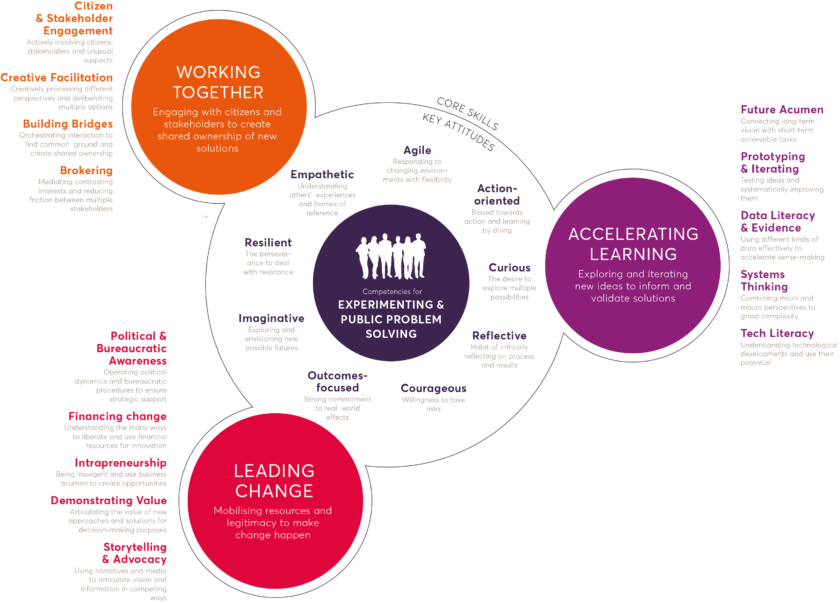We worked with leading innovation practitioners from around the world to define the key skills, attitudes and behaviours that public innovators combine in order to successfully solve public problems. Introducing our new competency framework.
Finding the space and time to invest in the future while being responsible for delivering services that people rely on today is a well-known dilemma for governments around the world.
We’ve seen a number of interesting project pilots and inspiring innovation labs but no the larger-scale shift from applying these promising to how governments actually operate. Governments are still struggling to embed innovation in their organisations.
The big question is: how we go beyond individual pilots, projects and labs? How best to apply and spread the approaches, skills and culture that increase the ability of governments to innovate?
Human resources as an enabler of public innovation
We think human resources (HR) has a role to play. There's a relationship between between public workforce skills and innovation. What if we made it easier to hire for the right skills? Governments are increasingly using competency management approaches to set up standards for professional behaviour and performance management, as well as to gain competitive advantage by integrating HR policies with business strategies.
But beyond the broader and more established employee characteristics and behaviours for innovative working - such as motivation, openness to ideas, and change management - less is known about the unique attitudes, skills and competencies needed to support public sector innovation. How do they differ from what people are normally hired on the basis of?
Innovators, but in government
There are already attempts to provide clarity on the core competencies of public sector innovation, from the OECD’s Core Skills for Public Sector Innovation, to Le Nuancier de Formation from La 27e Region.
More clarity on what characterises innovative activity is good. But government is a different beast to most organisations, in scale if nothing else. So what do those innovative skills look like there?
Experimental problem solving
Problem solving is at the heart of how governments operate, and so we need to demystify where innovation approaches can be useful and what the relevant skills and competencies are to actually do the problem solving.
This is core to our work on developing the new competency framework for experimental problem solving. By framing our competencies around experimental problem solving, we try to emphasise how core attitudes and characteristics, in combination with key skills and competencies, enable behaviours that increase the likelihood of successful problem solving activities and better improve capacity. To be reductionist about it:
Skills + attitude (+ circumstance) = Behaviour.
More than brainstorming
Creative thinking techniques and brainstorming are useful for generating ideas, but there are other important competencies needed to systematically create, authorise, test and improve on ideas. The ideas are the easy part.
How we developed the framework
We want the framework to be useful and practical, rather than purely theoretical. We relied on experience to create it:
- The Nesta Innovation Skills team have worked in and with multiple pioneering government innovation labs and teams for a considerable amount of years. This was our starting point.
- Interviewed and workshopped with over 30 leading public sector innovation practitioners from around the world.
- Tested our research with governments and innovation experts to ensure accurate representation, relevance and usefulness.
Taking this forward
Over the coming months, we will co-develop and refine concrete behavioural indicators and assessment criteria. And most importantly, we will be working directly with ambitious governments to test and experiment with how the competency framework can be integrated into their innovation learning journey as part of systematic capacity-building activities.
Content principles for the framework
The framework identifies core skills needed by public servants in order to experiment and adopt a greater range of innovative practices for public problem solving. Some important content principles are:
The broader innovation skillset
The attitudes and skills outlined in the framework are the broader elements that, in combination, drive successful application of experimental problem solving activities. They are crucial for successfully creating impact with established innovation methods, such as human-centred design, behavioural insights, data-science, foresight, etc., which each require a set of more technical skillsets.
Creating and maintaining the mandate for innovation
We’ve found that the effort required to create the space and legitimacy for innovation in government is often significantly underestimated. Good ideas can’t flourish in a hostile environment. So in addition to the skills needed to simply apply innovation methods, our framework focuses on innovation craft. That is, how might we practically and effectively navigate, apply, embed and organise for innovation approaches in government and how to create an enabling environment to make innovation happen and ensure impact.
Team-focused skills framework
Teams are central to successful problem solving and so we start with the team, rather than the individual, as the unit of action. The framework presents a diverse palette of skills and attitudes that are rarely all found in one individual, but need to be present within the wider innovation team. The challenge (and opportunity) is to combine these skills and attitudes in ways that make the team greater than its individual members.
Framework of complex skills
Solving complex problems involves managing the intricate tensions and dynamics between opposing mindsets, skillsets and ways of acting. Such dynamics include: being disruptive and challenging the status quo, while being humble and integrative; making decisions in the face of uncertainty while being able to legitimise these decisions; having a clear plan of action, while adapting to and improvising for unforeseen situations; exploring new possible futures, while focusing on outcomes and committing to real-world effects; keeping the big picture in mind while also considering citizens' needs at an individual level; being reflective and critical while having a strong bias towards action.
All this requires ongoing judgement and the ability to combine multiple different attitudes and skills at the same time. For these reasons, it is important to recognise the elements presented in the framework as “complex skills”.
The framework
With these content principles in mind, we have attempted to describe key attitudes and skills that provide a combined view on what it takes to set up and run explorative innovation processes, while also creating an enabling environment for innovation within an administrative and political context. The framework describes three core categories that - according to our experience and research - are crucial to form the basis of successful experimental problem solving:
- Accelerating learning: Exploring and experimenting to identify knowledge gaps, create new understanding and inform decision-making in new ways
- Working together: Engaging with citizens and multiple stakeholders to ensure co-creation and collaborative ownership of new solutions
- Leading change: Creating space for innovation and driving change processes to mobilise people, inspire action and ensure strategic outcomes
How we plan to use it and next steps
As with many competency frameworks focused on change and innovation, there is a risk of it becoming a static, aspirational artefact rather than a practical tool for shifting practice. In this light, we see our research so far and this synthesis as only a starting point. In its current version, the framework mainly serves the purpose of bringing some clarity to the core elements and as a point of reference to enable further dialogue within the community of practice.Going forwards, we will be focusing on a number of activities to operationalise, test and further develop the framework into concrete activities, tasks, roles and incentive structures that can support real behaviour change. Our aim is to create:
- Tools for setting (un)learning objectives. We will develop context-sensitive and customisable behaviour indicators to support capacity development and assess the impact of innovation learning.
- Team and organisational assessment tools. We will generate tools that can help you assess the readiness and capability of your team, organisation and wider ecosystem.
- Team roles. We will develop a set of innovation team roles to help break down the tasks and functions of an innovation team and support governments in team design and management.
- Learning support and reflection tools. We will develop a set of practical frames for practitioners to use as systematic reflection for professional development and collective sense making.
- Rethinking HR strategy. We will apply the framework to explore how to develop more effective HR strategies focused on behaviour change, enabling better performance and recruitment for successful problem solving.
All of these will be tested and developed further in practice with ambitious government partners.Growing the innovation skillsets and capabilities of the public workforce requires informing hiring practices, career development and training opportunities. It also requires creating the right incentives, processes and structures for public sector innovation. Governments are often aware of all this, and yet struggle with knowing where to start.This framework is meant to be a first step in supporting these efforts and enabling innovation approaches to become strategic drivers of successful experimental problem solving activities. We welcome your feedback. We are especially keen to engage with governments, organisations and people that are doing interesting work in this area and/or want to explore possibilities for transforming their organisations for the better.



